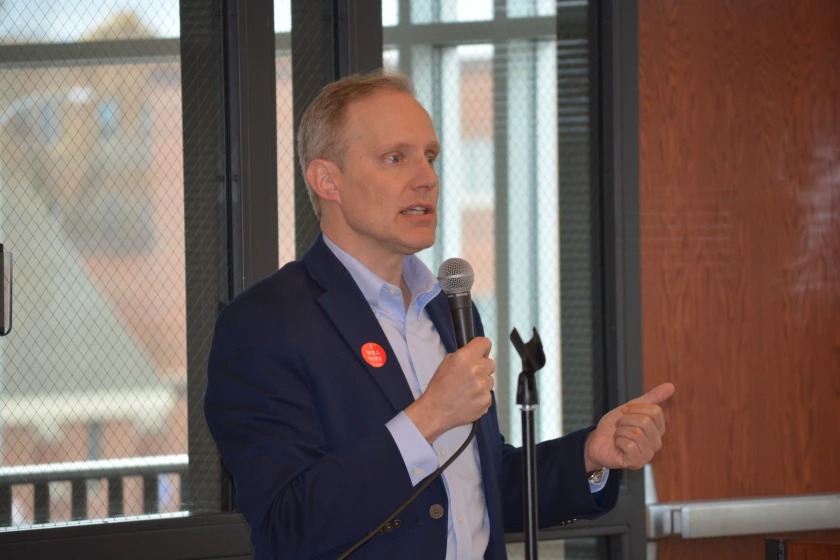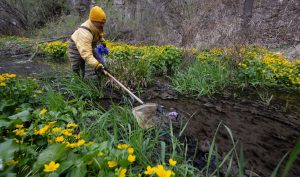
Secretary of state seeks ‘high turnout and low drama’ for Minnesota in November
Minnesota Secretary of State Steve Simon has a wish for this election cycle. It is simply spoken but may be challenging to make real, at least in part.
“What I would wish for is high turnout and low drama, that is what I want,” Simon said Wednesday, April 17, at the League of Women Voters of the Willmar Area’s “Hot Topics” conversation held at the Willmar Public Library.
The League of Women Voters invited Simon to speak about elections and voting, causes close to the organization’s heart. During his hour-long talk, Simon spoke on new election laws, voting in Minnesota and the challenges of disinformation and misinformation. He said his office and the League of Women Voters can work together to spread the correct information about voting and elections in Minnesota and advocate for voting.
“We are in the democracy business,” Simon said.
For decades, Minnesota has long been one of the top — if not the top — states in the nation for election turnout. In three of the last four elections, Minnesota has had the best voter turnout of the country.
Simon is optimistic that will hold true in 2024. A big reason for Minnesota’s success is a variety of election bills the Legislature, both Republican- and Democrat-led, has passed over the years, Simon said.
“They’ve done a good job balancing two things … access and security,” Simon said. “You want everyday people to be able to vote pretty easily. Security means you want only eligible voters, and no one else taking advantage of that accessibility.”
Laws that have helped with voting accessibility include same-day voter registration, which has been allowed for 51 years, and the opening of absentee voting to all voters, approved in 2013.
“We couldn’t have known in 2013 that in seven years that would basically save the election,” Simon said, pointing to the large number of absentee voters in 2020 due to the pandemic.
In 2023, state lawmakers passed a variety of new and updated voting laws, covering voting rights, registration and protection for election workers.
“Last year, 2023, in the Legislature, it was a really banner year for the democracy business,” Simon said. “I think they’re going to put us in an even better position, balancing access and security.”
Included in the voting and election laws passed last year was restoring the voting rights of those who have been convicted of a felony but have completed their incarceration sentence.
“That is 50,000-plus Minnesotans who got the right to vote back,” Simon said, adding that a big push for his office is to spread the word about this change to those it impacts.
On the voter registration side, Minnesota will now provide automatic voter registration when eligible Minnesota residents renew or apply for a driver’s license, though they can choose to opt out.
Simon explained that only proven American citizens will be able to register to vote, and that undocumented immigrants applying for a license will be removed from the voter registration pile.
Minnesota teenagers age 16 and 17 are now able to pre-register to vote. They complete the registration paperwork so that when they turn 18, their registration is automatically completed so they can cast their ballot during the first election in which they are eligible. Simon has already visited more than 30 high schools in the state, helping sign students up.
“If someone votes the first time they are eligible, they are far more likely to make it a lifelong habit,” Simon said.
One action Minnesota took that may never actually go into effect is passing the National Popular Vote Interstate Compact, which says that when enough states that total 270 Electoral College votes approve the legislation, those states will give all their electoral votes to the candidate who wins the national popular vote.
This means no longer would the presidency be given to a candidate who is second in the popular vote.
“It is no longer tenable for us to be electing the person who got the second-most votes to the most powerful job in not only the country but, practically speaking, the world,” Simon said.
This isn’t a knock on former presidents George W. Bush or Donald Trump, who both won the presidency but lost the popular vote. Simon said they were elected president fair and square.
The law also wouldn’t get rid of the Electoral College, but instead, use it to make sure the candidate with the most citizen votes wins. The U.S. Constitution already gives each state the right to choose how it appoints its members to the Electoral College.
“It could be many, many years, decades whether or if we reach 270,” Simon said.
While the state’s election laws will most likely continue to help with the high voter turnout portion of Simon’s 2024 wish, having an election free of drama — especially in a country so divided — will be a little harder to pull off.
The challenges of disinformation, misinformation and the additional problems that can be caused by deepfakes and artificial intelligence are all things Simon is trying to push back on.
“We can lead with the truth,” Simon said.
Simon said he has no issue with people disagreeing with him, or about the laws or how the voting system works. He wants all eligible voters to have the same opportunities to take part in the election but hopes everyone can express their beliefs and opinions in a controlled, non-violent way during a very intense political year with a lot of strong feelings and harshly expressed opinions.
“We are electing the most powerful person on planet Earth,” Simon said. “I think a little intensity and passion are called for.”
Related Articles
Wisconsin GOP Senate candidate: ‘Almost nobody in a nursing home’ capable of voting
Trump loses bid to halt Jan. 6 lawsuits while he fights criminal charges in the 2020 election case
Trump presses Republicans for kickbacks when using his likeness
Biden counters RFK Jr. with Kennedy family endorsements
Biden is off on details of his uncle’s WWII death as he calls Trump unfit to lead the military


